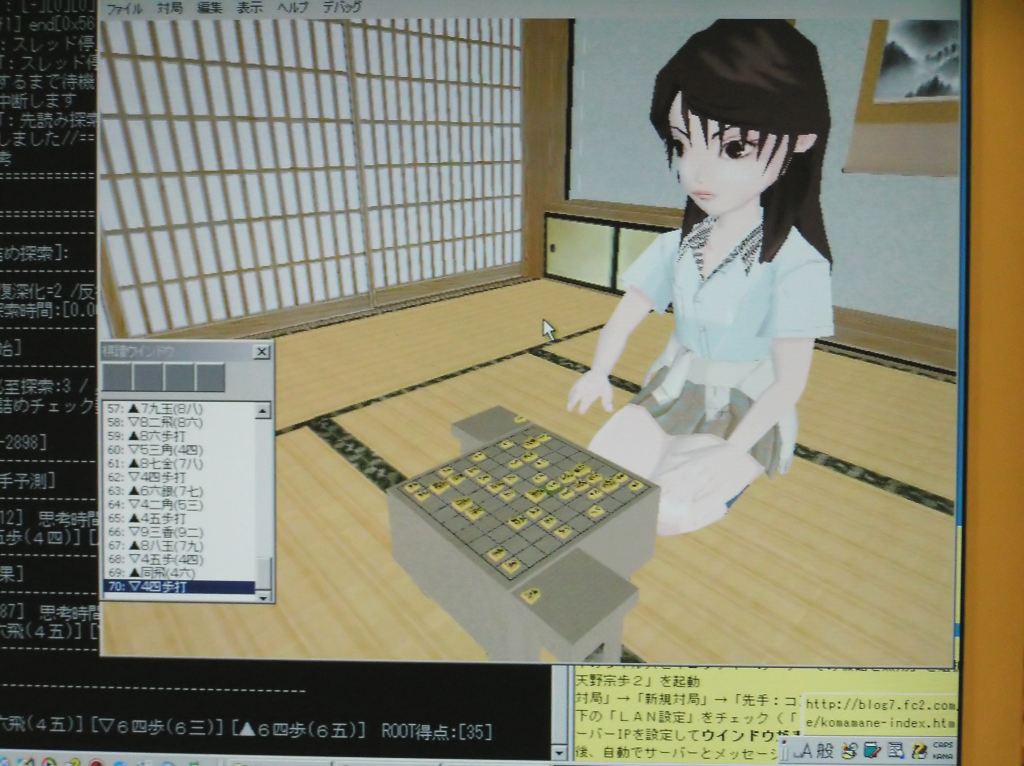
Amano Soho 2: eye for detail.
Despite my pessimistic mood, there were all kinds of things to look forward to in this tournament. For example, Jeff Rollason would come to the tournament for the first time in 4 years. His plan was to participate in 2005 as well, but those who have read my report on the 2005 tournament know that Jeff was unable to come at the final moment. This time he would be here and we had been exchanging information on our program's test results for weeks. We also exchanged recent versions of our programs, which showed that testing is a strange beast. When I played Shotest on my computers, Spear would win most games, but when Jeff played Spear on his computers, Shotest would win most games. The conclusion seemed to be that there was probably little to separate the programs.
The other things to look forward to this tournament were the participation of Bonanza and Tanase's new program. Bonanza had become famous in a very short time, being a free shogi program that was made in about a year by a programmer with little knowledge of shogi. It had already beaten strong amateur players and had beaten KCC and GPS Shogi in the Internet tournament played a few weeks before the CSA tournament. Bonanza would be a favourite to make it to the final round, but it was unclear how far it would go from there.
Tanase is the main programmer of IS Shogi (sold under the commercial name Todai Shogi), but he had decided to abandon the work on IS Shogi to make a completely new program that would not only be much stronger than IS Shogi, but had the higher aim of being strong enough to challenge top professionals. Tanase is one of the few Japanese I know who has no problem with expressing strong ambitions. His new program (unnamed in the final participant list) would definitely be one to watch.
Tanase may not have been there, but Bonanza was doing as expected: it had won all its games so far. Looking at the programs in the first preliminary round, it didn't seem like there would be much competition for Bonanza. Still, there was plenty to see in this round. For example, the program Amano Soho had a really cute interface, showing a 3D "manga" girl playing the moves of the computer.

Amano Soho 2: eye for detail.
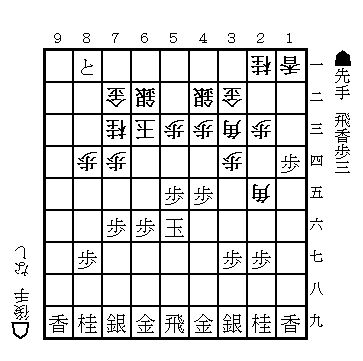
Avante against Daemon shogi: double climbing king.
Avante's result was not enough to reach the second preliminary round, though. Avante ended in 10th place, while only 8 programs qualified. As expected, Bonanza won every game, followed by Yamada Shogi with one loss, Amano Soho, Auau Shogi, Garyu and WILDCAT with two losses and My Move and Mattari-Yuchan as the programs with three losses that made it through. For My Move it was the first time to qualify, but all the other programs had been in the second preliminary stage before (albeit that Garyu had a different name).
Oki was the odd program out, and this seems to be a pattern. It qualified in 2003, but was unable to participate on the second day because the programmer Masumoto suddenly became ill on the evening of the first day. Oki qualified in 2004, but in 2005 it also ended in 9th place, just missing out on qualification.
No. Program Name 1 2 3 4 5 6 7 Pt SOS SB MD *1 Bonanza 12+ 18+ 23+ 3+ 8+ 5+ 4+ 7.0 25.5 25.5 19.5 *2 Yamada Shogi 10+ 21+ 3- 11+ 13+ 8+ 7+ 6.0 26.0 21.0 15.0 *3 Amano Soho 2 7+ 15+ 2+ 1- 5+ 17+ 6- 5.0 33.0 21.0 12.0 *4 Auau Shogi 23- 14+ 12+ 10+ 7+ 9+ 1- 5.0 26.0 18.0 11.0 *5 Garyu 14+ 23+ 20+ 8+ 3- 1- 17+ 5.0 25.0 13.0 8.0 *6 WILDCAT 20- 16+ 14+ 19+ 9+ 7- 3+ 5.0 23.5 17.5 10.0 *7 My Move 3- 9+ 10+ 13+ 4- 6+ 2- 4.0 32.0 16.0 8.0 *8 Mattari-Yuchan 24+ 17+ 22+ 5- 1- 2- 15+ 4.0 27.0 9.0 5.0 9 Oki 15+ 7- 11+ 12+ 6- 4- 19+ 4.0 26.5 12.5 6.0 10 AVANTE 2- 11+ 7- 4- 24+ 12+ 16+ 4.0 26.0 11.0 6.0 11 Daemon Shogi 21+ 10- 9- 2- 19+ 23+ 13+ 4.0 22.5 8.5 4.5 12 Maruyama Shogi 1- 13+ 4- 9- 21+ 10- 20+ 3.0 27.0 7.0 2.0 13 Ryuma Shogi 18+ 12- 16+ 7- 2- 22+ 11- 3.0 24.5 7.5 2.5 14 Sugi Shogi 5- 4- 6- 21+ 18- 20+ 22+ 3.0 23.5 6.0 2.0 15 Gasho! 9- 3- 21+ 23+ 20- 16+ 8- 3.0 21.0 6.0 2.0 16 HIT Shogi + SS 19+ 6- 13- 24+ 22+ 15- 10- 3.0 20.5 5.5 2.0 17 Narikin Shogi 22- 8- 24+ 18+ 23+ 3- 5- 3.0 20.5 4.5 1.0 18 Sexy AI-chan 13- 1- 19= 17- 14+ 21- 24+ 2.5 21.5 4.0 0.0 19 Hayabusa 16- 20+ 18= 6- 11- 24+ 9- 2.5 21.5 3.0 0.0 20 God Shogi 6+ 19- 5- 22- 15+ 14- 12- 2.0 23.5 8.0 0.0 21 Tsubakihara 11- 2- 15- 14- 12- 18+ 23+ 2.0 22.5 3.5 0.0 22 Ojiro 17+ 24- 8- 20+ 16- 13- 14- 2.0 19.0 5.0 0.0 23 Masuda Shogi 4+ 5- 1- 15- 17- 11- 21- 1.0 29.0 5.0 0.0 24 Misaki 8- 22+ 17- 16- 10- 19- 18- 1.0 21.0 2.0 0.0 * Bonanza, Yamada Shogi, Amano Soho 2, Auau Shogi, Garyu, WILDCAT, My Move and Mattari-Yuchan qualify for the second qualification round.Late in the evening of the first day, Jeff arrived after a very long journey. The first worrying thing for him was that when he unpacked the computer from his suitcase, it seemed like it had been handled with a hammer, having a big dent at the side despite huge stickers shouting FRAGILE! HANDLE WITH CARE!. It seems that airlines needn't bother with these stickers if they are so obviously ignored.
When we tried to play a test game against each other, it turned out that the computer would heat up very quickly and even shut down automatically at times. While waiting for Jeff to try and deal with this problem, Spear played a test game against Bonanza and won. In the end, it seemed like Jeff had the problem fixed and we played three games, Spear winning two and Shotest winning one. That was a pretty good result and I decided that there was not much I could do to improve the program, except for adding the loss against Shotest to the book to avoid the same game happening if we would play each other the next day.
However, the certificate had some interesting information as well: it showed Spear's record in those ten tournaments. It had played 94 games in the CSA tournament so far, winning 48 games and losing 46. Barely a majority of wins, but more importantly, it meant that the sixth game in this tournament would be the 100th CSA game by Spear.
For Spear the tournament started more or less as expected. The first round it won against Nazoteki Denki (not a bad program, but for some unknown reason Spear has never lost against it). In the second round, the opponent was Bingo Shogi and in that game Spear showed that it was out of its depth against the potential finalists and lost quite convincingly. The third round was another win, this time against Kinoa Shogi.
Shotest had more problems in the first three rounds. In the first round, the problems of Jeff's computer resurfaced and it shut itself down halfway during the game against Usapyon in a position that seemed good for Shotest. Fortunately, Hiroyuki Iida's TACOS team had a spare computer and generously offered to lend this to Jeff for the rest of the day. As a matter of fact, this machine was even a little faster than the one Jeff brought. It didn't help in the second round, but a loss against the strong GPS Shogi was more or less expected. The third round finally brought a win against Amano Soho.
After five rounds, both Spear and Shotest had two wins and three losses. Spear would play its 100th CSA game against... Shotest! The first time we ever played in the tournament, so this was double special. I would have liked to add that Spear won a brilliant game, but the truth was that the game was pretty bad, particularly by Spear. Not a game I would like to remember, but because of its special occasion I think I will have no choice!
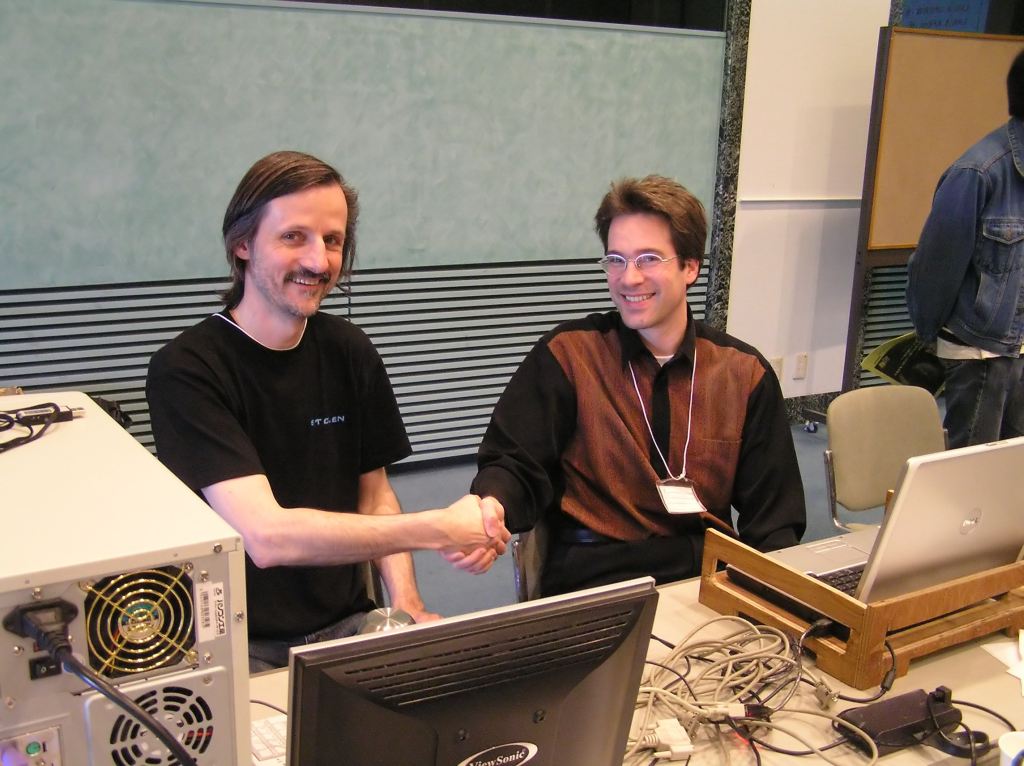
SPEAR's 100th CSA game was against Shotest. A special game but the result I would rather forget.
Meanwhile, at the top of the table there was also a lot of drama. Otsuki Shogi, hardly a favourite to qualify for the finals, lost its first game but then went on to win 8 games in a row to claim first place. Kakinoki Shogi, which had failed to qualify last year, won its first seven games to be the first program to qualify. It then lost two to drop to second place. TACOS won the first five games, but then lost two against Otsuki and Kakinoki, making qualification hardly straightforward, but wins against Kanazawa Shogi and Bonanza were good for third place. Bonanza also qualified, despite losses against Bingo Shogi and TACOS.
These were the four programs with 7 wins and they would be accompanied by one program with 6 points. It turned out that Dragon's Egg had the highest sum of opponent's score. This must have been a disappointment for Bingo Shogi, which seemed to have had the tougher opponents (playing the first four programs, while Dragon's Egg had only played against number 1 and 4), but the fact that Bingo had been paired against some low programs made the difference. GPS Shogi also missed out on the final, but they could point at a single game that did them in: a loss against Usapyon. Tough luck for Bingo and GPS, but the past CSA tournaments have shown that if you don't score 7 wins or more, qualification is basically in the lap of the gods.
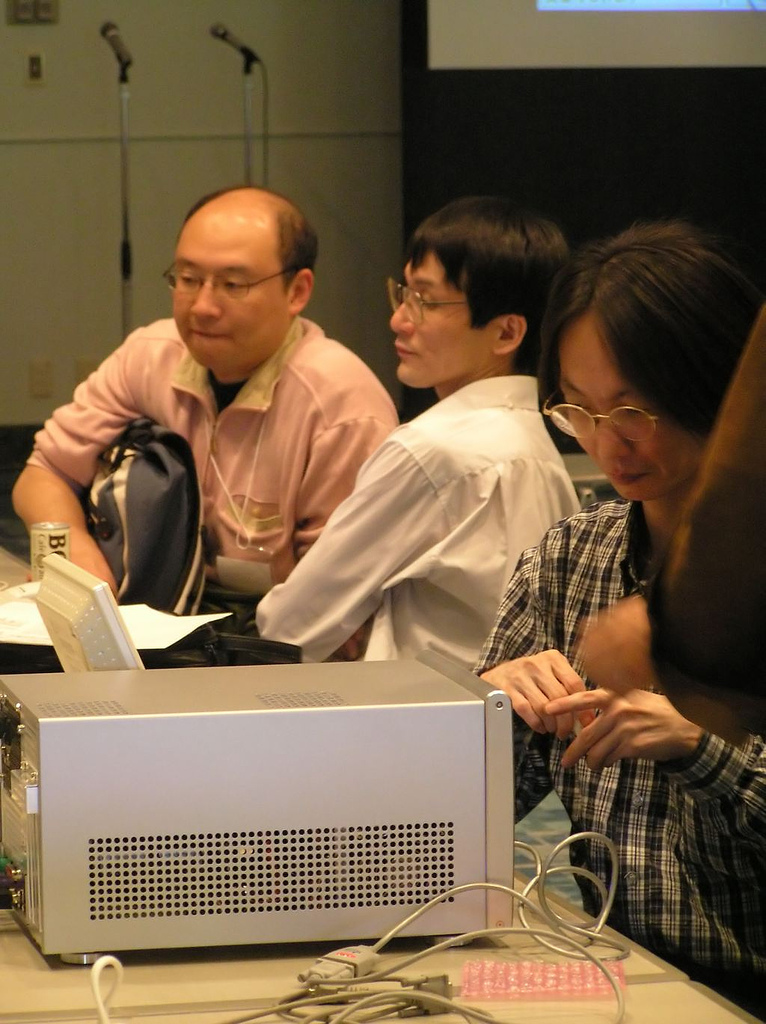
The faces say it all: this was not multiple world champion Kanazawa (right) and multiple finalist KFEnd's (middle) finest hour.
No. Program Name 1 2 3 4 5 6 7 8 9 Pt SOS SB MD *1 Otsuki Shogi 4- 18+ 23+ 16+ 13+ 6+ 3+ 5+ 2+ 8.0 46.0 39.0 30.0 *2 Kakinoki Shogi 21+ 14+ 13+ 8+ 7+ 3+ 6+ 4- 1- 7.0 50.0 35.0 25.0 *3 TACOS 20+ 10+ 18+ 5+ 6+ 2- 1- 14+ 4+ 7.0 49.0 34.0 24.0 *4 Bonanza 1+ 24+ 6- 9+ 22+ 7+ 10+ 2+ 3- 7.0 47.0 34.0 25.0 *5 Dragon's Egg 12+ 11+ 7- 3- 9+ 8+ 18+ 1- 16+ 6.0 47.5 26.5 18.5 6 Bingo Shogi 23+ 19+ 4+ 22+ 3- 1- 2- 10+ 8+ 6.0 46.0 24.0 15.0 7 GPS Shogi 17+ 15+ 5+ 13- 2- 4- 14+ 11+ 9+ 6.0 45.5 27.5 18.0 8 K-Shogi 11+ 12+ 14- 2- 19+ 5- 13+ 15+ 6- 5.0 43.5 20.5 12.5 9 Kinoa Shogi 10+ 20+ 19- 4- 5- 22+ 15+ 18+ 7- 5.0 39.0 17.0 10.0 10 Nara Shogi 9- 3- 16+ 23+ 24+ 18+ 4- 6- 14+ 5.0 39.0 14.0 9.0 11 Shore 8- 5- 22- 21+ 20+ 17+ 19+ 7- 13+ 5.0 35.5 16.5 9.5 12 WILDCAT 5- 8- 17= 15- 23+ 20- 24+ 21+ 18+ 4.5 30.5 9.0 5.0 13 Usapyon 15+ 17+ 2- 7+ 1- 14- 8- 16+ 11- 4.0 46.5 17.5 8.0 14 Kanazawa Shogi 22+ 2- 8+ 24+ 16- 13+ 7- 3- 10- 4.0 41.0 12.0 6.0 15 Shotest v8.0 13- 7- 21+ 12+ 18- 19+ 9- 8- 17+ 4.0 37.0 14.0 6.5 16 Nazoteki Denki 19- 23+ 10- 1- 14+ 24+ 22+ 13- 5- 4.0 35.0 9.0 4.0 17 Garyu 7- 13- 12= 20+ 21- 11- 23+ 24+ 15- 3.5 32.5 6.0 2.0 18 KFEnd 24+ 1- 3- 19+ 15+ 10- 5- 9- 12- 3.0 43.5 8.0 3.0 19 SPEAR 16+ 6- 9+ 18- 8- 15- 11- 22+ 20- 3.0 37.0 11.0 4.0 20 My Move 3- 9- 24- 17- 11- 12+ 21- 23+ 19+ 3.0 34.0 9.5 3.0 21 Amano Soho 2 2- 22- 15- 11- 17+ 23- 20+ 12- 24+ 3.0 32.0 7.5 3.0 22 Yamada Shogi 14- 21+ 11+ 6- 4- 9- 16- 19- 23- 2.0 39.0 8.0 0.0 23 Mattari-Yuchan 6- 16- 1- 10- 12- 21+ 17- 20- 22+ 2.0 39.0 5.0 0.0 24 Auau Shogi 18- 4- 20+ 14- 10- 16- 12- 17- 21- 1.0 37.0 3.0 0.0 * Otsuki Shogi, Kakinoki Shogi, TACOS, Bonanza and Dragon's Egg qualify for the finals.Licking our wounds with a Chinese dinner, Jeff, Yoshinori and I had a little bet about the final standings in the finals. This was our betting sheet:
Yoshinori Reijer Jeff
Gekisashi 2 1 1
KCC 5 2 4
YSS 1 3 3
Otsuki 4 8 5
Kakinoki 7 6 6
TACOS 6 5 7
Bonanza 3 4 2
Dragon's egg 8 7 8
We thought that Gekisashi was the clear favourite to win it again, with YSS and Bonanza coming second and third. Like everybody
else, we were quite wrong...
The most closely watched game was of course the game between YSS and Bonanza. A very interesting game, but YSS always seemed a little bit better and won. A small disappointment for all the Bonanza fans who were following the tournament over the Internet (this year, a number of games was broadcast live for the first time). There was one other incident in the first round: the server computer that was running the Internet games was accidently shut down, so the live broadcast was terminated. Fortunately, it had no effect on the games, as the only game that was terminated was TACOS-Otsuki Shogi and both programs were able to restart the game from the position where it was stopped (TACOS won).

Hiroyuki Iida watching TACOS. TACOS had their best result so far.
In the second round, the results were more or less as expected. The only result that could have been considered an upset was the victory of Bonanza against KCC, but because Bonanza had won against KCC in the Internet tournament a month ago, this was actually not a shocking result. It would have an important impact on the final outcome of the tournament, though.
Even more impact on the final result had the game Gekisashi-Bonanza in the third round. Gekisashi had a mate and didn't find it! (see the game at the end of this article.) Computers are so strong at tsume shogi that this is almost unimaginable, but it happened in the biggest game of this year's CSA tournament. Bonanza didn't have a tsume shogi solver, so it was happy in a position it was losing (ignorance is bliss). More salt in the wound was that the commercial version of Gekisashi played the winning moves instantly. Lucky break for Bonanza number 1.
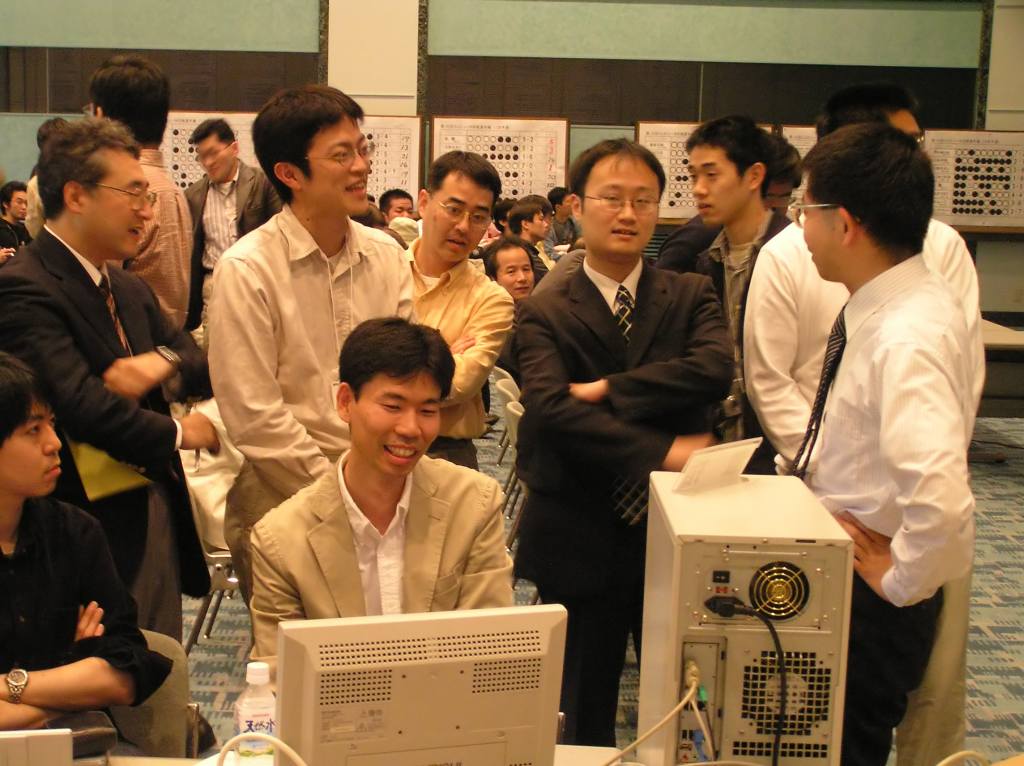
Top professional Watanabe (Ryu-O title holder) also has a look at Gekisashi (middle, looking straight at the camera). I am afraid we were unable to put much fear in his heart.
After three rounds YSS seemed to be in control with three wins, but an unexpected loss against TACOS in the fourth round threw the tournament wide open again. Lucky break for Bonanza number 2! In the past, the CSA tournament has often been a runaway victory, with the winning program already decided before the final round, but this year the suspense would last until the end. Significant was that Bonanza was co-leader after the 4th round, and that it had already played the strongest programs.
YSS took the first big hurdle by beating Gekisashi in the 5th round, so there were three programs with four wins: YSS, Bonanza and KCC. The game between YSS and KCC in the 6th round was supposed to decide which program would stay in the lead with Bonanza, but after YSS started an attack that weakened its iron strong position, the game ended in a draw by repetition of moves. Unlike the game between Gekisashi and Kakinoki, this was a repetition of moves that neither program could get out off. However, it also meant that Bonanza was the only program with 5 points and only needed a win against Dragon's Egg to win the tournament. Lucky break for Bonanza number 3!
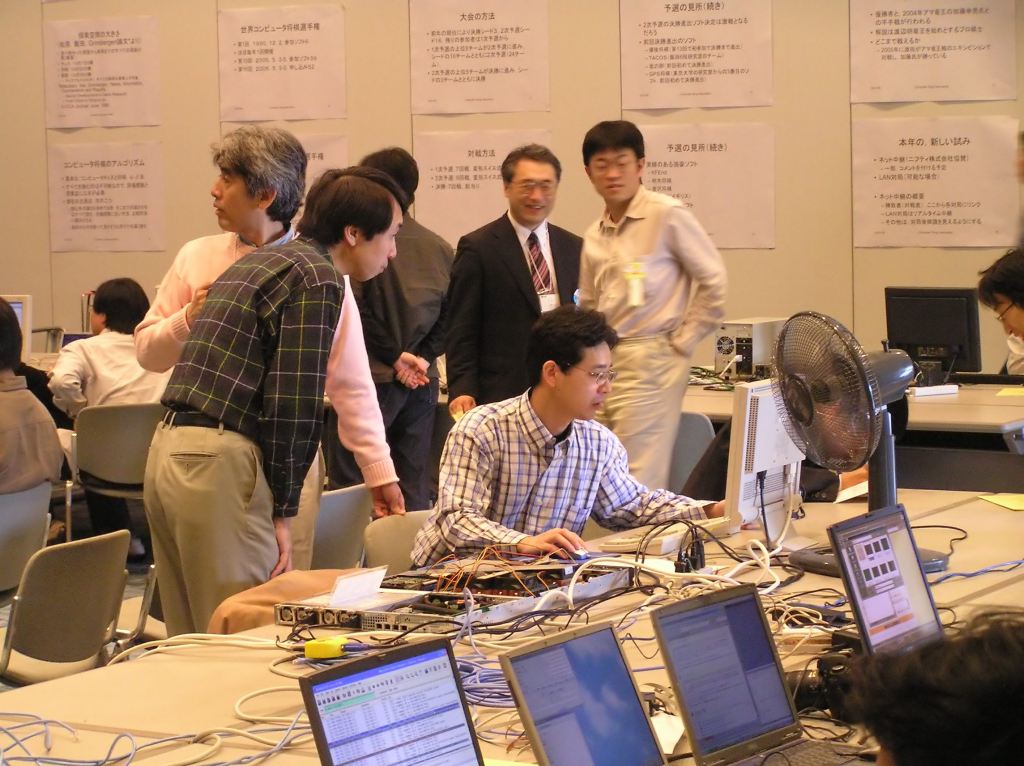
YSS was the favourite, but let this one slip away.
It was also the first time that the programmer of the winning program was not at the tournament. Kunihito Hoki was not able to come and his program was operated by someone else. However, he did follow the tournament from Canada and had to stay up very late for the final result, but it must have been worth it.
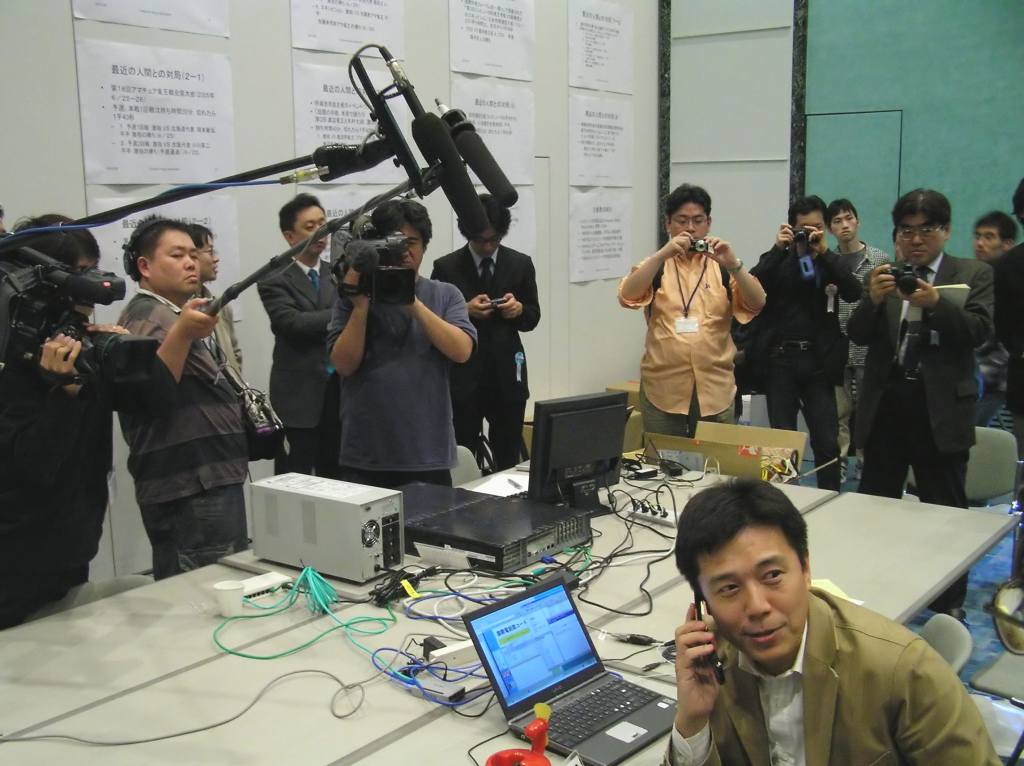
Operator Hirozawa on the phone with Hoki in Toronto.
No. Program Name 1 2 3 4 5 6 7 Pt SB MD 1 Bonanza 2- 3+ 5+ 6+ 8+ 4+ 7+ 6.0 16.5 11.0 2 YSS 1+ 6+ 7+ 4- 5+ 3= 8+ 5.5 13.0 7.0 3 KCC Shogi 7+ 1- 4+ 8+ 6+ 2= 5+ 5.5 11.0 7.0 4 TACOS 8+ 5- 3- 2+ 7+ 1- 6+ 4.0 9.0 3.5 5 Gekisashi 6= 4+ 1- 7+ 2- 8+ 3- 3.5 5.0 1.0 6 Kakinoki Shogi 5= 2- 8+ 1- 3- 7+ 4- 2.5 1.0 0.0 7 Dragon's Egg 3- 8+ 2- 5- 4- 6- 1- 1.0 0.0 0.0 8 Otsuki Shogi 4- 7- 6- 3- 1- 5- 2- 0.0 0.0 0.0After the final round, an exhibition game was played between Bonanza and top amateur player Yukio Kato (2004 Amateur Ryu-O and 2005 Asahi Amateur Meijin). It seemed like Bonanza's luck finally had run out in this game, because it was a convincing victory by Kato.
One thing that is clear is that the program is very fast. There was quite a lot of special hardware in this tournament, but Bonanza ran on a laptop with two processors (interesting detail: it had a little red fan to cool it, which was plugged into the USB port of the computer). Despite this, Bonanza in general was able to search 800,000 positions per second, compared to about 500,000 for Gekisashi. With this, Bonanza could see more than 10 moves ahead, which seems to solve most tactical problems and gave its accurate positional evaluation the control it needed to win this tournament.
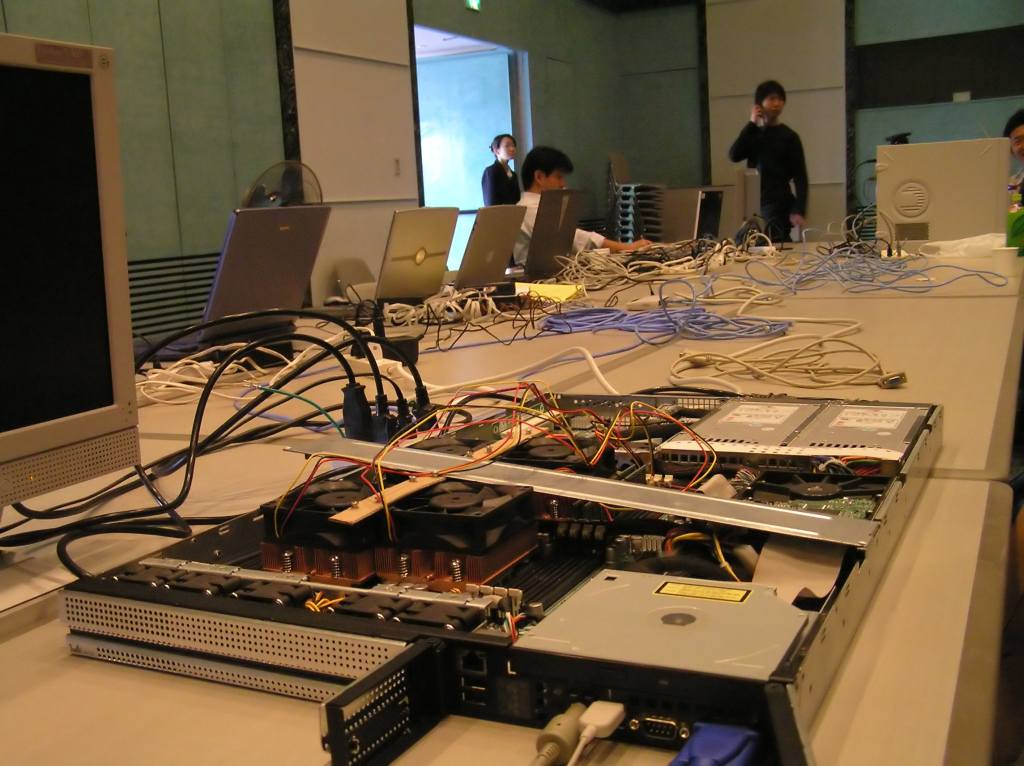
The special parallel hardware of YSS. However, the off-the-shelf hardware of Bonanza prevailed.
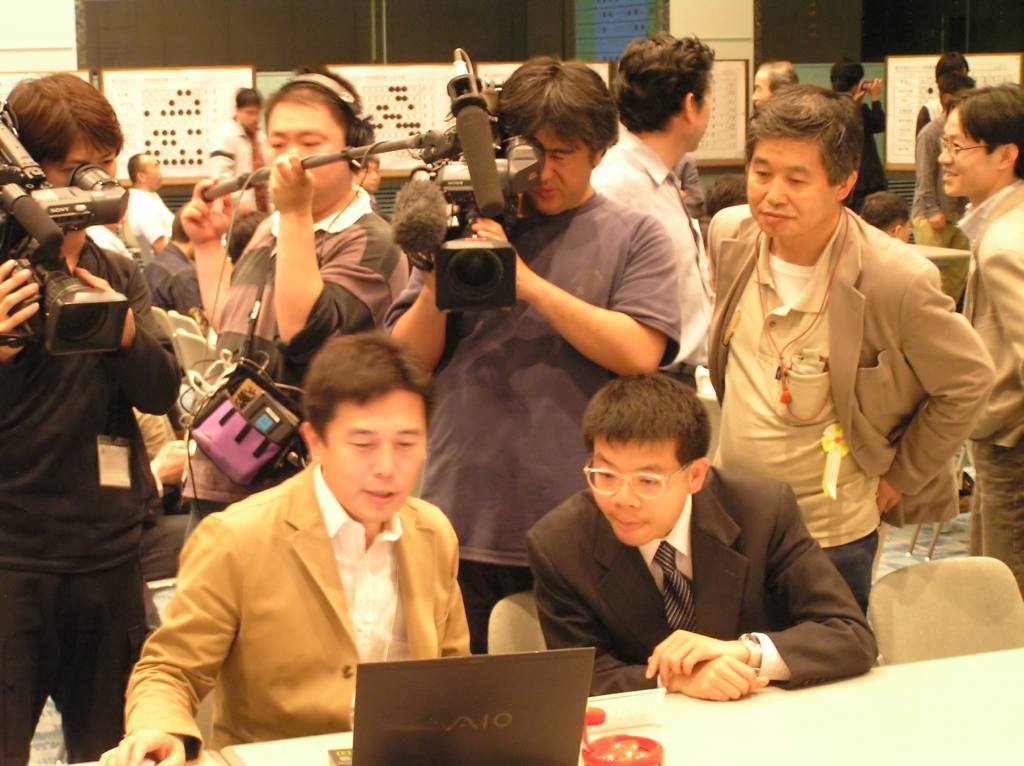
This was Bonanza's year. Professional Katsumata has a look, while operator Hirozawa explains.
[Black "Gekisashi"] [White "Bonanza"] 1.P7g-7f 2.P3c-3d 3.P2g-2f 4.P4c-4d 5.S3i-4h 6.R8b-4b 7.K5i-6h 8.K5a-6b 9.K6h-7h 10.K6b-7b 11.P5g-5f 12.K7b-8b 13.G4i-5h 14.L9a-9b 15.P9g-9f 16.K8b-9a 17.S7i-6h 18.S7a-8b 19.P2f-2e 20.B2b-3c 21.S6h-5g 22.G6a-7a 23.B8h-7g 24.S3a-3b 25.K7h-8h 26.G4a-5a 27.G6i-7h 28.G5a-6b 29.S4h-5i 30.S3b-4c 31.P3g-3f 32.S4c-5d 33.P6g-6f 34.P6c-6d 35.P9f-9e 36.G6b-7b 37.B7g-8f 38.S5d-6c 39.P6f-6e 40.S6c-7d 41.N8i-7g 42.P4d-4e 43.B8fx6d 44.S7dx6e 45.B6dx5c+ 46.S6ex7f 47.+B5c-7e 48.S7fx7g+ 49.G7hx7g 50.P7c-7d 51.+B7e-7f 52.P*5e 53.S*5c 54.R4b-2b 55.N2i-3g 56.P5ex5f 57.S5gx5f 58.P7d-7e 59.+B7fx7e 60.G7b-6c 61.P*5e 62.R2b-7b 63.P*7d 64.G6cx7d 65.+B7e-4h 66.N*6d 67.S5cx6d= 68.G7dx6d 69.G5h-6g 70.S*6e 71.S5fx6e 72.G6dx6e 73.P*7f 74.P*5f 75.S*6f 76.G6ex5e 77.S6fx5e 78.B3cx5e 79.G*6f 80.S*3i 81.G6fx5e 82.S3ix2h= 83.G5ex5f 84.S2hx1i+ 85.P*6d 86.P*7e 87.P6d-6c+ 88.P7ex7f 89.+P6cx7b 90.P7fx7g+ 91.G6gx7g 92.G7ax7b 93.R*2b 94.R*6i 95.R2bx7b+ 96.L*7a 97.+R7b-4b 98.G*8i 99.K8h-9g 100.S*8h 101.K9g-9f 102.S8hx7g= 103.B*5e 104.P*6d 105.B5ex7g 106.R6i-6g+ 107.+B4h-6f 108.+R6gx7g 109.+B6fx7g 110.B*6c 111.P*7d 112.B6cx7d 113.N*8e 114.B7dx8e 115.K9f-8f 116.L7ax7g+ 117.K8fx8e 118.G8ix9i 119.+R4bx8b 120.K9ax8b 121.R*4b 122.G*7b 123.S*7a?? (There is a mate here after Rx7b+ Kx7b S*6c Kx6c S*5d Kx5d Gx4e etc.) 124.K8bx7a 125.G*6a 126.K7ax6a 127.B*4c 128.K6a-7a 129.R4bx7b+ 130.K7ax7b 131.S*6a 132.K7b-8b 133.G*7b 134.K8b-9a 135.G7bx8a 136.K9ax8a 137.B4c-5d+ 138.K8a-9a 139.+B5dx6d 140.N*8b 141.+B6dx8b 142.K9ax8b resigns